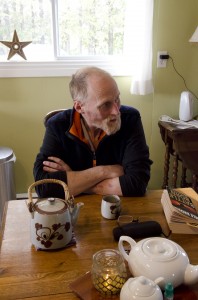Organ transplant and donation vital to save lives
By: Gail Paquette

MADOC, Ont.( 18/03/12) John Putnam spends a lot of time these days reading and gaming on the computer. Diagnosed with cirrhosis of the liver 10 years ago meant he could no longer work. Fatigue plagued him. "If I won the lottery I would launch a campaign to build awareness around organ donation," he said. Photo: Gail Paquette
Somewhere three people in failing health are waiting for the phone to ring. One of those people will die with in three days.
Myths and misinformation surrounds organ donation and transplant.
“It is easy to judge when you are not the one dying.” says 53 year old John Putnam.
John Putnam from Madoc, Ontario was diagnosed with cirrhosis of the liver. His life dramatically changed. It is not clear how long he has lived with the disease or even how he got it. Obvious symptoms often do not appear until decades after infection. By then, either cirrhosis or cancer of the liver may have developed.
Although liver disease is stereotypically linked to alcohol or drugs, the truth is that there are over 100 known forms of liver disease caused by a variety of factors and affecting everyone from infants to older adults.
Putnam needs a liver or part of one. He is only one of thousands on the list for organ donation. His life expectancy at this point is unknown.
Some people need transplants because they were born with a structural abnormality or a disease. Others are unlucky enough to develop an illness that caused an organ to fail.
Simply catching a cold or flu can result in them requiring a heart transplant for cardiomyopathy, a disease that severely affects the heart muscles’ ability to contract.
For lung recipient Shillane Labbett, born with cystic fibrosis was given a life expectancy of 5 years. At 33 years of age she is grateful for every day she spends with her husband Simon.
“At first I didn’t want a transplant, It just seemed unnatural.” she said.
However her doctor and husband talked her into it.
“My lungs once again began to massively hemorrhage from a burst bronchial artery,” said Labett.
She was admitted to the ICU and put on a ventilator because she could no longer breathe on her own. Then the phone call came.
Unable to speak she wrote. “I feel so sorry for the donor’s family.”
Labbett had her surgery the following day.
“I was able to breath and walk and do the things normal people do. I spent time walking along the waterfront in Toronto and walking in malls shopping. I hadn’t been able to for so long.”
Shillane and Simon Labbett are members of the Kingston Chapter of the Transplant Advocacy group and strongly believe that the best way to present organ transplantation to the world is knowledge and communication.
“The world wide shortage of organs is going to get worse before it gets better, but there are options” said Shillane’s husband Simon. “Presumed consent, financial compensation for the living and deceased donors and point systems would all increase the supply of transplant organs.”
For Putnam, his symptoms are increasing and he fears a transplant will not get to him in time.
“The transplant specialist told me if he had a live donor they would transplant now”
Although that sounds ideal Putnam says, “How am I supposed to find a donor? There is no 1-800 number.”
Not only is his blood type O+ meaning he is a universal donor not recipient but when he reaches the stage of life or death, will someone have made consent to give their organ?
He lives each day as it comes. It is less than half the life he had before.
He goes to bed and cant sleep and wakes up tired.
“I have to realize that tasks that used to take me two hours to complete before I got sick take weeks to complete now.”
The longer he waits, the worse he gets. Doctor appointments fill his day. He is poked and prodded and medicated.
There are several reasons for the shortage of organs. Perhaps the most common reason is that people are hesitant to donate.
Physicians may neglect to inquire of family members whether they would consent to donating organs when their loved one dies. In other cases, the deceased’s wishes to donate his or her organs may not be known by those in the position to act on those wishes.
The most important reason to consider organ donation is that you can save someone’s life. Organ donation can give someone in need a new heart, liver, or set of lungs, and many transplant patients go on to live long, successful lives after their transplant surgery.
On the Kingston Transplant Advocacy group website, a woman who refers to herself as Pauline’s sister reflects on her experience saying her sister died a hero.
“My story, although heartbreaking and sad was bittersweet. I lost a loving sister, who in death gave new life to four people who were at the end-stages of their lives.
Amidst the heartbreak and tears, knowing that part of her would live on by giving life to others sustained and gave us strength, some peace and solace. I could not help but think of those other families and how they must have felt when they received that special phone call.”
 Print This Post
Print This Post






